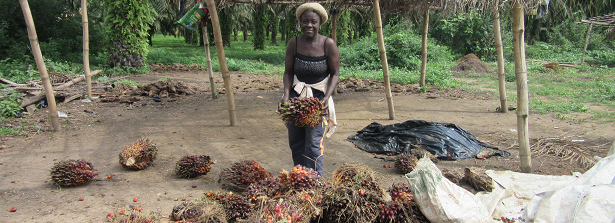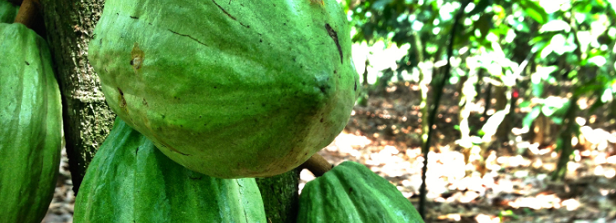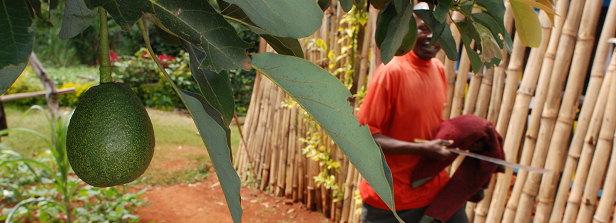Inclusive value chain collaboration in Ghana and South Africa

Duration: October 01, 2014 – October 01, 2018
Project information
Aim: This research examines how partnerships can be better aligned with tree crop farmers’ livelihood trajectories. The project researches whether and how value chain collaboration (VCC) involving tree-crop farmers in Ghana (cocoa and oil palm) and South Africa (macadamia and avocado) can be made more equitable and inclusive. The aim is to enhance farmers’ innovation potential and food security with better business-smallholder partnerships.
Objective: The projects objective is to contribute knowledge that helps achieve more equitable terms of engagement in VCC, more food sovereignty (farmers’ access to food and autonomy over production and marketing), and sustainable landscapes.
Method: This programme envisages action research in ‘learning platforms’ which are arenas for joint learning and negotiated knowledge. Researchers liaise with existing innovation platforms and networks and stimulate new stakeholder coalitions where this is needed to build a bridge between local-level initiatives and higher-level partnerships and policy communities. The project aim is to mediate between different knowledge systems and governance levels and facilitate technological and institutional innovation. Sub-projects contribute to (i) the co-production of knowledge about the diversity of smallholder strategies and livelihood trajectories and how these play out in VCC and landscape approaches, (ii) multi-stakeholder definition of the sustainability choice space of commoditised tree-crop farming, and (iii) smallholders’ inclusion in adaptive learning processes related to innovations and landscape approaches initiated through VCC.
Countries: Ghana and South-Africa.
Dutch policy goals: Increase sustainable food production; Improved access to nutrition; and Efficient markets.
Progress reports
Year 1: A year of developing full proposals for the sub-projects and a common theoretical framework; PhD and MSc training; consolidating the partnership; and laying the basis for the dissemination of results, culminated in successful learning platforms in Ghana and South Africa in August 2015. A baseline survey and participatory workshops with small-scale cocoa and oil palm farmers (Ghana) and macadamia and avocado farmers (South Africa) generated preliminary insights into different farmer profiles and their diverging pathways to the future. Results were presented in multi-stakeholder learning platforms with government officials, NGO representatives, private sector actors, researchers and farmers. Knowledge was exchanged, brokered and jointly produced among sectors and actors that usually rarely communicate, applying and further refining a novel methodology for participatory scenario building. Satellite images and land-cover maps were collected and analysed to assess the effects of tree-crop farming on landscape configurations over time. The project website (https://inclusivevcc.wordpress.com) is up and running, presenting information about the project, team members, partners, and outputs. The latter include a peer-reviewed paper that integrates the notions of value-chain collaboration (VCC), food sovereignty, and landscape governance into a coherent analytical framework; a Newsletter sent to partners and stakeholders to inform them about project updates; MSc theses; all presentations held at the learning platforms; fieldwork and learning platforms reports; and two info-sheets with preliminary results of the baseline survey. Additional funding from the Lindt Cocoa Foundation and active involvement of the Ghana Agricultural Associations Business & Information Centre (GAABIC) and South Africa Subtropical Growers’ Association (Subtrop) increased private sector involvement. An unexpected result was that tree-crop farmers seem to be food secure, at least in South Africa. We therefore added a control group of smallholder vegetable farmers. We also found limited interaction between the cocoa and oil-palm sector, indicating a gap that this project may address.
Summary mid-term review: Following a sequence that starts with a describe & validation stage, the first year revolved around exploring livelihoods and diversity among tree-crop farmers in Ghana and South Africa, which led up to learning platforms where the data collected was validated with farmers, policymakers and practitioners. Year 2, the explain stage, explored change agents and key actors in value chain collaborations (VCCs) closest and most important to farmers, leading to the second learning platform themed “Brokering innovation – the role of change makers”. Acquired insights made us realise that we should organise the learning platforms where farmers are embedded in networks – the district level. In Ghana we thus entered the negotiating stage in which knowledge is exchanged and contested across levels and professions. The focus thus shifted from the mismatch between input and service packages in VCC and farmers’ needs to inclusion in institutional settings, processes of cross-level and peer-to-peer learning, and the role of change makers. This line will be continued in Year 3 – the explain / negotiate stage – when we further develop a more nuanced understanding of inclusiveness and try to influence how support is given – from an understanding of “VCC from below”.
Year 3: Year 3 focused mainly on two dimensions of inclusive value chain collaboration (VCC), namely alignment with farmers’ realities, and space for inclusive learning and innovation. Further evidence confirmed heterogeneity among smallholder tree-crop farmers, challenging policy narratives that advocate value chain integration as an opportunity to lift people out of poverty, and – specifically for South Africa (SA) – the linear pathway from subsistence, via emergent to commercial farmers, thus revealing that more targeted interventions are needed. Experience with learning platforms as spaces for inclusive learning and knowledge co-creation was documented in a concept note which outlined scope and design principles to help local institutional actors incorporate the concept in their organisations’ workplans. The first steps were taken to phasing out and create more institutional ownership over the learning platforms, with a format in Ghana whereby local institutional actors were invited to assume responsibility over the design and organisation of the next learning platform. The partners in SA already assumed this ownership: the organisation of the learning platform and theme setting was largely aligned with their research agendas. This embedding strategy in turn also explains the divergent pathways in both countries. The first results on the implications of tree-crop expansion on food security also became available. Analysis of baseline data in SA revealed different outcomes of experience-based indicators (suggesting that there are no food insecurity issues among tree-crop farmers), and nutrient-based indicators (suggesting deficient dietary diversity). Spatial analysis of a mixed oil-palm/cocoa landscape in Ghana revealed decreased availability of land for food cropping due to the expansion of cocoa and oil palm. For predominantly female oil-palm processors in Ghana, trade-offs exist between their engagement in the value chain and the food security of their households, due to less engagement in food cropping and increasing dependency on food markets where prices are increasing.
Year 4: A brochure and concept note were disseminated in Ghana to help local organizations incorporate the learning platform (LP) concept in their work plans. Local researchers were trained in the LP methodology and committees installed to organize the 2019 LP. Consortium partners in South Africa (SA) had already taken ownership over LP theme setting and organization.
Research on effects of tree-crop expansion on food security showed that in both countries food is produced through intercropping during early stages of tree-crop establishment. In Ghana this compensates for increasing substitution of food with tree crops. In SA this temporarily improves food availability for marginalized farmers, but food production may decrease once land becomes fully planted with trees and trees are mature. In Ghana, value chain collaborations (VCCs) do little to address seasonal food insecurity and nutrient deficiency.
Research on support structures revealed limited understanding of farmer diversity and local complexity. information gathering focuses on yield (Ghana), number of tree crops planted (SA) and farm size and landownership (both countries). Ghana’s hierarchical information infrastructure limits room for manoeuvre by district-level actors. SA’s transformation policies’ shift from re-distributive agrarian reform to ‘inclusion as value chain integration’ results in differentiated support for ‘subsistence’ and entrepreneurial farmers.


